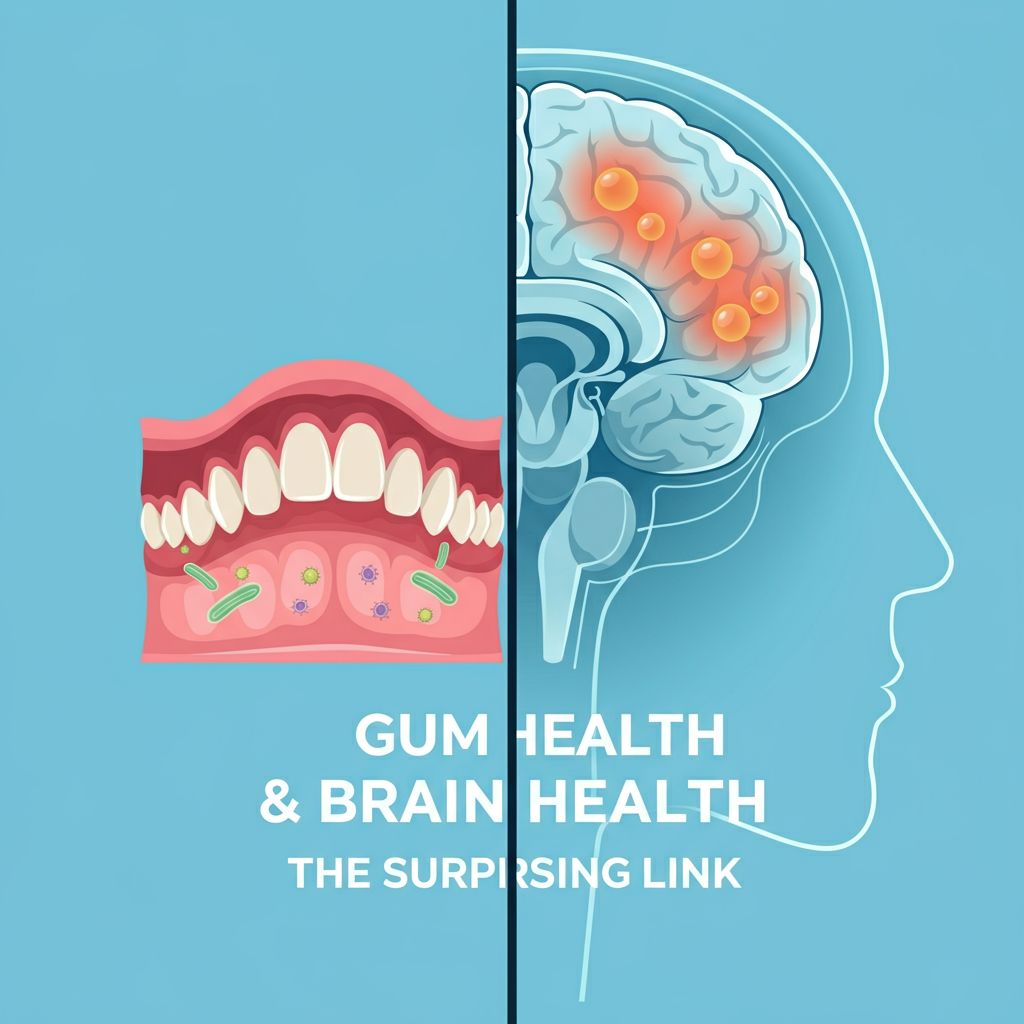Your morning routine probably includes brushing your teeth, but what if we told you this simple act might be protecting more than just your smile? Emerging research suggests a surprising connection between gum disease and Alzheimer’s disease—one that could change how we think about oral health and brain protection.
At Pershing Family Dental, we believe in educating our patients about the full-body benefits of excellent oral care. Recent scientific discoveries reveal that maintaining healthy gums might play a crucial role in preserving cognitive function as we age. Let’s explore this fascinating connection and what it means for you and your family.

The Science Behind the Connection
For decades, scientists have observed that people with Alzheimer’s disease often have poor oral health. Initially, researchers assumed this was simply because cognitive decline made it harder to maintain proper dental hygiene. However, new evidence suggests the relationship might work in reverse—that gum disease could actually contribute to the development of Alzheimer’s.
The breakthrough came when researchers began examining the brains of deceased Alzheimer’s patients. What they found was startling: bacteria typically associated with gum disease were present in brain tissue. This discovery sparked a wave of research into how oral bacteria might influence brain health.
Bacteria: The Unwelcome Brain Invaders
The primary culprit in this oral-brain connection appears to be a bacterium called Porphyromonas gingivalis (P. gingivalis). This organism is one of the main causes of periodontitis, the advanced form of gum disease that affects nearly half of American adults over 30.
When P. gingivalis and other oral bacteria enter the bloodstream through inflamed gum tissue, they can travel throughout the body—including to the brain. Studies have found evidence of these bacteria in the brains of Alzheimer’s patients, suggesting they can cross the blood-brain barrier and establish themselves in neural tissue.
But the bacteria don’t just hitchhike to the brain—they actively cause damage. P. gingivalis produces toxic enzymes called gingipains, which can destroy brain cells and interfere with normal cellular processes. These toxins may contribute to the formation of amyloid plaques, the sticky protein deposits that are a hallmark of Alzheimer’s disease.
The Inflammation Connection
Gum disease is essentially a chronic inflammatory condition. When bacteria accumulate along the gum line, your immune system responds with inflammation to fight the infection. While this response is meant to protect you, chronic inflammation can become problematic.
Research shows that people with severe gum disease have elevated levels of inflammatory markers in their blood. This systemic inflammation doesn’t stay in your mouth—it circulates throughout your body, including to your brain. Chronic inflammation is a known risk factor for Alzheimer’s disease, as it can damage brain cells and disrupt normal brain function over time.
This inflammatory cascade creates a vicious cycle. Gum disease triggers inflammation, which may contribute to brain changes associated with Alzheimer’s. As cognitive function declines, oral hygiene often suffers, leading to worsening gum disease and more inflammation.
What the Research Reveals
Recent studies have provided compelling evidence for the gum disease-Alzheimer’s connection:
Cognitive Decline Patterns: Large-scale studies following thousands of participants over many years have found that people with severe gum disease are significantly more likely to develop cognitive decline and dementia. One study of over 8,000 participants found that those with chronic periodontitis had a 70% higher risk of developing Alzheimer’s disease.
Brain Imaging Findings: Advanced brain imaging techniques have revealed that people with gum disease show changes in brain structure that mirror those seen in early Alzheimer’s disease. MRI scans of individuals with periodontitis often display unfavorable markers associated with cognitive decline, including brain shrinkage in areas critical for memory and learning.
Laboratory Evidence: When researchers exposed brain cells to P. gingivalis in laboratory settings, they observed increased production of amyloid beta, the protein that forms the characteristic plaques of Alzheimer’s disease. This suggests a direct mechanism by which oral bacteria could contribute to brain pathology.
The Promising Implications
While the connection between gum disease and Alzheimer’s is concerning, it also offers hope. If poor oral health contributes to cognitive decline, then maintaining excellent oral hygiene could be a powerful tool for brain protection.
Prevention Strategy: Good oral health habits—regular brushing, flossing, and professional cleanings—might serve as an accessible and cost-effective way to reduce Alzheimer’s risk. This is particularly important given that there are currently no cures for Alzheimer’s disease, making prevention our best strategy.
Treatment Target: For individuals already showing signs of cognitive decline, addressing gum disease might help slow progression. Some researchers are even investigating whether antimicrobial treatments targeting oral bacteria could benefit Alzheimer’s patients.
Holistic Health Approach: This research reinforces the concept that oral health is integral to overall health. Your mouth isn’t separate from the rest of your body—it’s a gateway that can influence your cardiovascular, immune, and now potentially your neurological health.
Important Caveats
While the research is promising, it’s crucial to understand the current limitations. Scientists have established a strong association between gum disease and Alzheimer’s, but they haven’t definitively proven that gum disease directly causes the neurodegenerative condition.
The relationship could be more complex than a simple cause-and-effect. It’s possible that both conditions share common risk factors, such as genetics or lifestyle habits, that make some individuals more susceptible to both gum disease and Alzheimer’s. Additionally, other factors like diet, exercise, sleep quality, and stress management also play significant roles in brain health.
Taking Action for Your Brain and Mouth
Given the potential connection between oral health and cognitive function, now is the perfect time to prioritize your gum health. Here’s what you can do:
Daily Care: Brush twice daily with fluoride toothpaste and floss regularly to remove bacteria and prevent plaque buildup. Consider using an antimicrobial mouthwash to further reduce bacterial load.
Professional Maintenance: Schedule regular dental cleanings and examinations. Professional cleanings remove tartar that brushing alone cannot eliminate, and regular checkups allow for early detection and treatment of gum disease.
Early Intervention: If you notice signs of gum disease—such as bleeding, swollen, or tender gums—seek treatment promptly. Early-stage gum disease (gingivitis) is completely reversible with proper care.
Lifestyle Factors: Don’t smoke, limit sugary foods and drinks, manage stress, and maintain a healthy diet rich in anti-inflammatory foods.
The Future of Oral-Systemic Health
As research continues to unveil connections between oral health and systemic diseases, dental care is evolving from a separate health category to an integral part of overall wellness. The potential link between gum disease and Alzheimer’s represents just one example of how caring for your mouth can benefit your entire body.
At Pershing Family Dental, we’re committed to helping our patients understand these connections and maintain optimal oral health throughout their lives. While we await more definitive research on the gum disease-Alzheimer’s link, one thing is clear: taking excellent care of your gums is a wise investment in both your oral health and potentially your cognitive future.
Your smile is worth protecting, and so is your brain. By maintaining excellent oral hygiene and staying current with professional dental care, you’re taking important steps toward long-term health and wellness. Contact us today to discuss how we can help you maintain optimal gum health as part of your overall wellness strategy.
